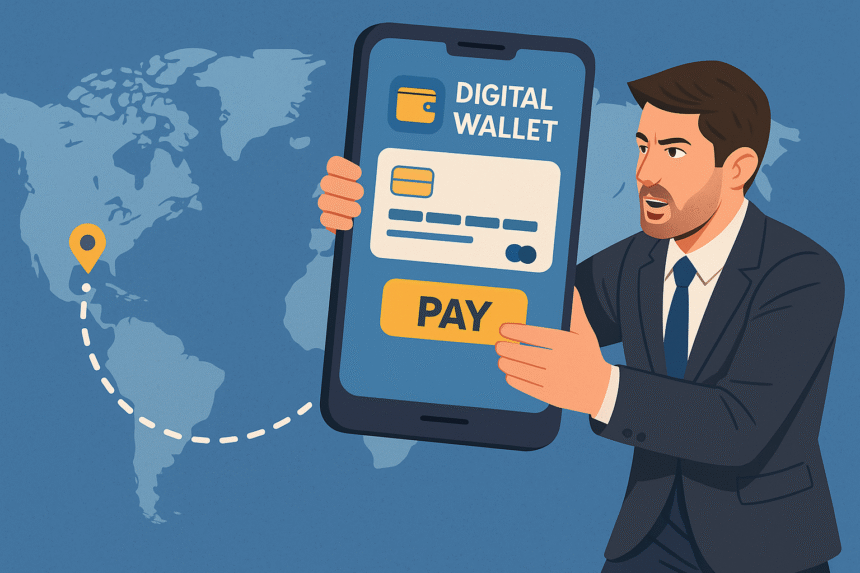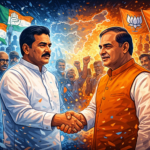Imagine this: You’re sipping a filter coffee in Bengaluru, scrolling through a US-based e-commerce website, and your finger hovers over the “Buy Now” button for that dreamy gadget. You click—and boom! “Payment method not supported in your region.”
- 🌐 Digital Wallet: Growing Fast, But Not Far
- 💬 “We Need Interoperability” – Alex Chriss, CEO, PayPal
- 🛫 UPI – India’s Secret Weapon?
- 💥 Why Cross-Border Payments Matter
- 📱 The Future of Digital Wallets: Borderless, Seamless, Fearless
- 😎 But First, The Tech Must Talk
- 🧠 The Smart Side of Smart Payments
- 🧩 Final Thoughts: It’s Time to Think Beyond Borders
Oof.
That’s the frustrating sound of a digital wallet being locked inside its own country. And according to Alex Chriss, the new CEO of PayPal, this digital border control needs to go!
🌐 Digital Wallet: Growing Fast, But Not Far
India has been on fire when it comes to digitizing payments. UPI, PayTM, PhonePe—heck, even your paanwala accepts QR codes now. From Tier 1 cities to remote towns, India has gone digital, fast and furious.
But here’s the thing: while these digital wallet ecosystems are growing rapidly within national boundaries, they still behave like shy kids at an international party—sticking to their own groups.
That’s the issue Alex Chriss flagged in a recent interview. He says digital wallets are great locally, but the moment you try to go global—poof! They turn into pumpkins.
💬 “We Need Interoperability” – Alex Chriss, CEO, PayPal
Chriss’s point is simple but powerful: most digital wallets are geo-locked. They’re built for one country’s systems, regulations, and preferences. That’s wonderful for local economies. But global commerce? Not so much.
He says, “There really is no mechanism to send money from one digital wallet to another across borders. They’re too native to their geography.”
Imagine needing five different wallets to travel across five countries. It’s like carrying five currencies—but with more passwords!
🛫 UPI – India’s Secret Weapon?
So what’s the solution? Chriss thinks the answer lies in UPI—India’s homegrown Unified Payments Interface. It’s fast, free (mostly), and functions round-the-clock.
Chriss hints at a grand plan: leverage the scale of UPI and make it global. Imagine paying for your Paris croissant or New York bagel with your Indian UPI-linked wallet. Now that sounds like the kind of digital dream we’d swipe right on.
He also said, “India is incredibly important to us. This partnership will let us tap into the strongest payment system in India—and take it global.”
💥 Why Cross-Border Payments Matter
Let’s break it down with a little imagination.
You’re a freelance designer in Mumbai. Your client is in Berlin. They want to pay you in Euros. You want rupees. You send a PayPal link. They click. Their bank stares back like a deer in headlights. Because somewhere in the middle, there’s a language mismatch between financial systems.
Or you’re a college student trying to subscribe to an online course hosted in the US. You enter your Indian card. Error. You try again. Declined. You cry a little.
Cross-border payments are the oxygen of the digital economy. Without them, we’re all just gasping for breath in separate financial rooms.
📱 The Future of Digital Wallets: Borderless, Seamless, Fearless
Here’s where it gets exciting. Imagine a digital wallet that speaks every language. It doesn’t care if you’re shopping from Singapore, sending money to Sweden, or freelancing for a client in Canada. One wallet. One world. No friction.
That’s not just a fintech fantasy anymore. It’s the road we’re on.
PayPal’s new CEO seems committed to leading that charge—by promoting interoperability, easing regulation bottlenecks, and aligning wallets globally.
Think of it as the “Visa-free travel” era—but for money.
😎 But First, The Tech Must Talk
What’s stopping this global harmony from happening?
One word: interoperability.
Most countries have their own versions of digital wallets. But their backends are like stubborn old grandpas—they won’t talk to anyone else’s tech without a bit of ego and protocol drama.
India has UPI. Singapore has PayNow. The US has Venmo and Zelle. But these systems often act like members of different WhatsApp groups—happy in their own bubble.
What we need is a universal translator for digital payments. Something like a fintech Google Translate—but for money movement.
🧠 The Smart Side of Smart Payments
When wallets go global, they’re not just smarter—they’re more inclusive.
Imagine:
- A farmer in India selling organic spices online—and receiving payments from France with a tap.
- A student in Delhi paying for a Harvard course—without asking Dad to chase Forex rates.
- A tourist in Thailand paying for street food—using their Indian QR code.
Digital wallets, if made borderless, could be the single biggest equalizer in global commerce.
🧩 Final Thoughts: It’s Time to Think Beyond Borders
Alex Chriss isn’t just blowing hot fintech air. He’s pointing at the real elephant in the digital room—our payment systems are too nationalistic.
We’ve got global apps, global marketplaces, global content, global shipping—but when it comes to digital wallets, we’re still stuck in customs.
Let’s fix that.
Because in a world where a meme can go viral in 200 countries within 30 minutes, your money should be able to move just as fast.












